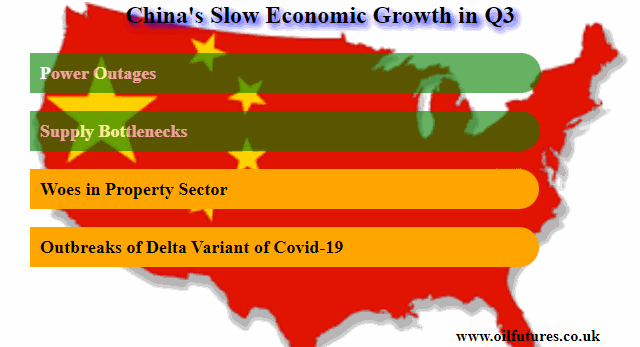China admitted on Monday that its economic growth
slowed down in the third quarter, Q3 and cited the main causes behind it.
The power outages come at the top of the list,
followed by the supply bottlenecks, woes in its vast property sector and of
course, the random outbreaks of the Delta variant of the Coronavirus.
The GDP in the Q2, from April to June, according to
the official figures, was 7.9%. It came down to 4.9% during the Q3,
July-September period; the expectation was a GDP of 5.2%.
The rate of growth has come down from 1.2% in the Q2
to 0.2% in the Q3 that worries the investors as never before.
China, however, did not acknowledge the potential
impact on its economy by the simmering political tension with its South-Asian
neighbours, India and the West.
Analysts had been concerned about the way the world’s
second largest economy was going to handle political issues with the countries
in question.
Although this factor was not part of the list that
China said, was behind the slow-down of its economy, it is in no way trivial.
Its trade with India, for instance, suffered
seriously when skirmishes broke out along the disputed border between India and
China. Although China did not reciprocate in kind, India played the economic
card against China, affecting its exports and investments.
The tension between the two neighbours shows no sign
of let-up; on the contrary, military build-up on both sides continues with
India digging strategic tunnels and acquiring French Mirage fighter jets. No
one believes that China stays passive in light of these moves by India.
When Indian media hypes up the existing tension
along the border, the vast Indian market reacts emotionally that in turn affects the
Chinese products on sale; it may cause a faint blip on an economist’s radar,
but in no way trivial on the ground.
The situation is the same with its South Asian
neighbours such as the Philippines, Vietnam, Malaysia, Indonesia, Brueni, Japan and of course, Taiwan;
markets in this region too, respond to national sentiments, when dormant, old, patriotic
issues are resurrected - from time to time.
Analysts often wonder why China stubbornly refuses
to address certain issues that the West has been raising for years such as the
privacy of data of the citizens of the latter. the former belive some of them could have been nipped in the bud.
The fate of Huawei is a case in point.
As a result, not only did the tech giant pay a
heavy price, but also suffered reputational damage to its brand in a very lucrative
market; up until then, Huawei products had been very popular in the Western markets
due to their affordability and of course, value for money.
Its tension with Australia does not help alleviate the economic woes either.
One of the reasons behind the power outages was the
lack of coal and China, more or less on impulse, turned to Russia, Indonesia
and Kazakhstan for the supply of the commodity, while turning its back on the
steady supplier for decades, Australia.
It looks like the three countries could not supply enough coal for the Chinese needs that in turn made it turn to LNG, liquid natural gas, to power up its generators. China recently announced that it would import LNG from the US, downplaying the cost in transit involving the vast distance.
The speed at which the issue evolved into a global energy cruch in the end shows that the rest of the world is not impervious to the ripples in the Chinese energy sector.
Despite the damaging headwinds, China is confident
it can get the growth back on track. It has every reason to be confident: it
handled the main Coronavirus outbreak, the first in the world, very well in a
relatively short period of time and repeated the success in the recent
outbreaks of the Delta variant too.
Despite the lingering tension, China still keeps the
communication lines open with the West; the telephone conversations with the
leaders of the West, more often than not, produce the corresponding desired
outcome too.
The release of Meng Wanzhou, the chief financial
officer of Huawei, from her house-arrest in Canada is a case in point. It followed
a phone conversation between President Biden and President Xi Jinping.
If China extends the flexibility in handling issues
of this kind further, it will help both China and the rest of the world at a
crucial time, when the world is about to recover from a once-in-a-century
pandemic.
At present, the world is in the middle of an energy crisis and it is now clear how the Chinese factor played a role in it that cannot be brushed off as insignificant.
The world knows how important the Chinese economy is
for the global growth. Nobody in the right mind trivialises this factor.







